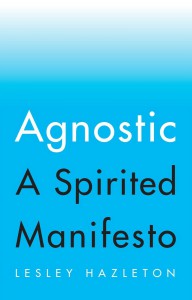Book Review: Agnostic: A Spirited Manifesto

BOOK BY LESLEY HAZELTON
RIVERHEAD BOOKS, 2016
224 PP.
If you want to get a spirited argument started among atheists, ask how we like to be identified—atheist, freethinker, skeptic, humanist, secular, bright—some will embrace all of these; some will embrace none. On the other hand, agnostic is a word that strikes many in the atheistic community as wishy-washy or at least transitory—a waystation between belief and disbelief. But in her book Agnostic: A Spirited Manifesto Lesley Hazleton looks to embrace the term as she straddles the line between atheism and some form of spirituality.
As the writer of the blog The Accidental Theologist, Hazelton has extensively thought and explored the line between belief and disbelief, and her exploration shows in this short, well-written, and very accessible book. Far from seeing it as a transition or a temporary undecided state, Hazelton puts forward Agnosticism as a positive philosophy where mystery is enjoyed and doubt is a driving force.
But hers is not a contest between belief in a personal God and nonbelief. Her religion is not the “prayers are answered and God has a plan for you” variety of religion. Rather, her straddle is between a hard line, cold, lifeless atheism, which she sees as a sort of in-your-face “New Atheism” and a sort of vague otherworldliness in the universe that brings about a sense of harmony and order, a type of power with which Einstein might have been comfortable. As she sets out in her chapter on the “three-letter word,” the definition of God she accepts as a possibility is a “mysterious, transcendent god”—a god that many would suggest is really no god at all.
She develops this idea even further in a well-written chapter on “making meaning,” where the idea of an “anthropomorphic god” (a god that would, I think, be the most representative of most people’s idea of god) is tossed aside with casual abandon and near contempt. She goes on, instead, in a beautiful essay about how meaning and significance in life is not imposed from outside but is found in the actual living out of our lives and our finding a path through our small part of the vast universe.
Hazleton embraces living with doubt and spends a few chapters discussing doubt and the role it plays in the forwarding of knowledge. She talks somewhat dismissively about the “dogmatic atheists” who assume that “science has all the answers.” But she then quotes numerous scientists, such as Richard Feynman, who insist that doubt drives science. There is no examination in this chapter of the role of doubt in religion. She finishes this chapter by stating that as an agnostic, “I place my faith in inquiry.” But she makes this statement in a way that suggests neither science nor religion does, even after the claims about inquiry being the driving force of science. It is one of the least satisfying chapters of the book.
In contrast, her chapter on the afterlife, or lack thereof, is outstanding. Hazleton has an absence of belief in any sort of an afterlife. As she explains early on and very much seems to believe, “The meaning of life is that it stops.” She then spins out a truly elegant chapter on how, in fact, it is the very absence of an afterlife that really gives life its meaning: “It’s not mortality that drains life of meaning, but immortality.” This view alone is enough to convince one that what she really is about is finding a way to make sense of life without reliance on the supernatural. She argues convincingly that death is only truly frightening to those who believe in eternal life and therefore in the possibility in eternal punishment.
Sometimes as humanists and atheists, we have to remember that most have not already travelled the path from religion to non-religion. Hazelton’s book is approachable, well-written, and raises thoughtful questions for those who have not pondered these questions seriously before. She also writes eloquently on some issues which atheists have pondered, such as the end of life, and its implications.
That she calls herself an agnostic rather than an atheist will strike atheists as a little disingenuous. She even states at one point, “I resist thinking of myself as spiritual.” She seems to want to deny the category “spiritual but not religious,”which has become increasingly prevalent in society but still reject the label of atheist as being too lifeless. Instead she embraces a lifestance centered on relationships, an awe of nature and the universe, and a spirit of inquiry founded on doubt and based on reason. She calls this being an Agnostic. It sounds a lot like humanism to me.
